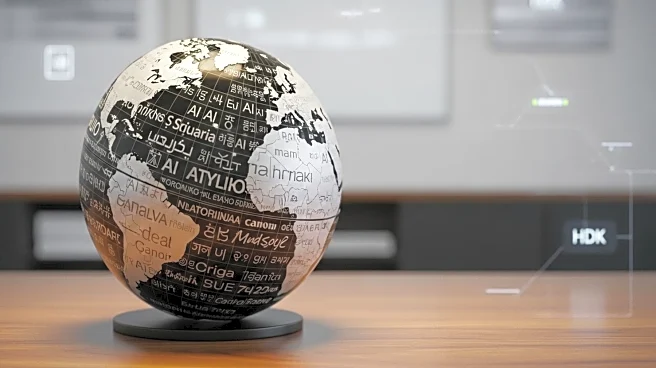What is the story about?
What's Happening?
The rise of AI-driven translation tools is significantly affecting the translation industry, leading to a decline in demand for human translators. Professionals like Nathan Chacón have observed a shift towards AI for document translation, impacting freelance opportunities. AI's ability to perform live translations is accelerating the transition from human to machine translation, raising concerns about job displacement and the loss of cultural context in translations. Despite AI's advancements, human translators remain essential for industries requiring linguistic precision, such as legal and medical fields.
Why It's Important?
The increasing reliance on AI for translations poses challenges for professionals in the industry, potentially leading to job losses and reduced opportunities. While AI offers efficiency, it may lack the cultural nuances and accuracy that human translators provide, especially in sensitive contexts. The shift towards AI-driven translations highlights the need for careful consideration of ethical and practical implications, ensuring that technology complements rather than replaces human expertise. This development underscores the importance of balancing innovation with the preservation of linguistic and cultural integrity.
What's Next?
As AI technology continues to evolve, the translation industry may need to adapt by focusing on areas where human expertise is indispensable. Professionals may seek to enhance their skills in areas less susceptible to automation, such as literary translation or specialized fields. Organizations utilizing AI for translations must implement safeguards to ensure accuracy and prevent bias, particularly in regulated industries. The ongoing dialogue between technology developers and industry stakeholders will be crucial in shaping the future of translation services.
Beyond the Headlines
The integration of AI in translation services reflects broader trends in automation and digital transformation, prompting discussions on the future of work and the role of human creativity. As AI becomes more prevalent, there may be shifts in educational priorities, emphasizing adaptability and cultural literacy. The ethical considerations surrounding AI's impact on language and communication highlight the need for responsible innovation, ensuring that technology serves to enhance rather than diminish human interaction.















